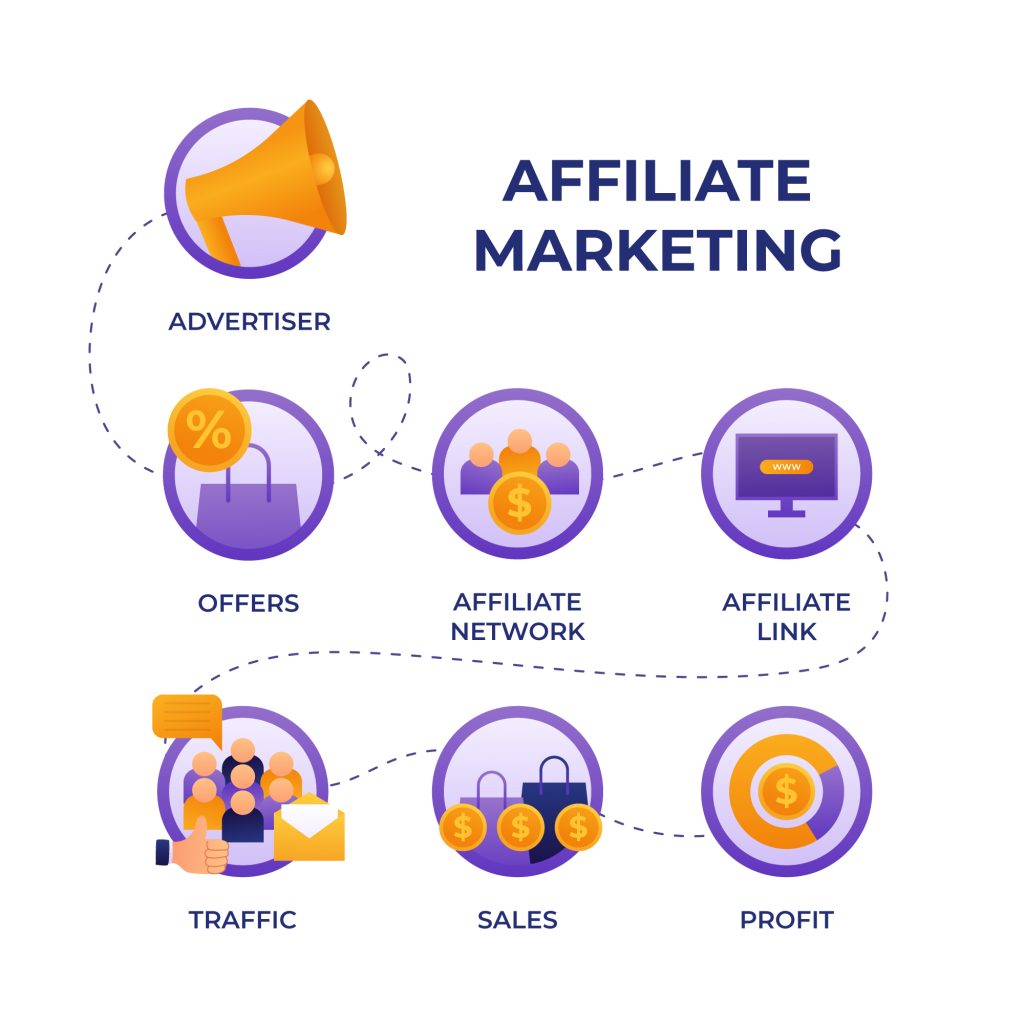Discover how to start affiliate marketing in 2025 with this thorough step-by-step guide. Learn the best strategies, tools, and platforms to launch and grow your affiliate business successfully—even as a beginner.
What Is Affiliate Marketing?
Affiliate marketing is a popular online business model where individuals earn a commission by promoting other people’s or companies’ products. It works by sharing unique affiliate links through blogs, websites, social media, or email. You earn a percentage of the sale when someone makes a buy through your link. This performance-based marketing method is perfect for beginners who want to generate passive income online. It requires little to no upfront investment. In 2025, affiliate marketing continues to grow as more businesses embrace digital sales channels and influencers seek monetization strategies.

Key Players in Affiliates Marketing
In affiliate marketing, several key players work together to make the process work effectively. The merchant (also known as the advertiser or product creator) is the business that offers a product or service. The affiliate (also called the publisher or marketer) promotes the product through content. They use links or ads to earn a commission on sales. The consumer is the end user who clicks the affiliate link and makes a buy. Lastly, the affiliate network acts as a middleman, providing tracking, reporting, and payment solutions between merchants and affiliates. Understanding these roles is essential to succeeding in affiliate marketing in 2025.
How Affiliates Marketing Works
Affiliate marketing works through a simple yet powerful process. An affiliate promotes a product or service using a unique tracking link. This link is provided by the merchant or affiliate network. When a consumer clicks on that link, they make a purchase or finish a desired action. This leads to the affiliate earning a commission. This process is tracked using cookies and affiliate IDs, ensuring that sales are properly credited. In 2025, this model continues to thrive. More businesses leverage influencers, bloggers, and content creators. They drive traffic and increase sales through performance-based partnerships.

Why Start Affiliates Marketing in 2025?
Market Trends and Growth

The Affiliate Marketing industry is growing remarkably. This growth makes it one of the most profitable digital marketing strategies in 2025. According to recent market reports, the global affiliate marketing market is projected to exceed $17 billion. This growth is driven by the rise of E-Commerce. Influencer marketing and the shift toward performance-based advertising are also contributing factors. Businesses of all sizes are increasingly investing in affiliate programs. Startups to global brands aim to boost their online sales. They achieve this while minimizing upfront marketing costs. This shift is opening up more opportunities for affiliates. Bloggers, YouTubers, and social media influencers can earn passive income. They do this by promoting products to niche audiences. Key market trends in 2025 include the rise of AI-powered affiliate tools. Mobile-first campaigns are also crucial. There is a growing focus on micro-influencers who offer higher engagement rates. Additionally, voice search is changing the promotion of affiliate links. Video content is changing the promotion of affiliate links. Short-form content platforms like TikTok and Instagram Reels are transforming how affiliate links are promoted. Consumers are becoming more tech-savvy. They are also more trust-driven. Affiliate marketers are now focusing on creating high-quality and value-driven content. This focus is to build credibility and boost conversions. As the affiliate landscape evolves, those who stay updated with trends will have a competitive edge. They gain this edge by investing in the right tools and platforms. Overall, affiliate marketing’s future remains strong, scalable, and full of potential for beginners and professionals alike.
Benefits of Affiliate for Beginners

- Low Startup Costs:
One of the biggest advantages of affiliate marketing is its low startup costs. It is an ideal online business for beginners. It is also suited for entrepreneurs on a budget. Unlike traditional businesses, affiliate marketing does not need inventory, office space, or large capital investments. You only need a computer and internet connection to start. All you need is a marketing platform like a blog, social media, or YouTube channel. Many affiliate programs are free to join, and you don’t need to create your own products. This low barrier to entry means you can begin earning commissions by simply promoting products or services you believe in. With smart strategies and consistent effort, affiliate marketing offers a cost-effective way to generate passive income online.- No Inventory or Shipping Required:
One of the major advantages of affiliate marketing is that you don’t need to deal with inventory. You also don’t have to manage shipping. Unlike traditional E-Commerce businesses, affiliate marketers promote products or services. They earn a commission for each sale. They never handle the product. All order fulfillment, packaging, and delivery are managed by the merchant or product owner. This eliminates the need for storage space, shipping fees, or customer service related to logistics. As a result, affiliate marketing becomes a low-risk way to start an online business. It is also a low-maintenance method to generate income from anywhere in the world.- Passive Income Potential:
Affiliate marketing offers powerful passive income potential. This makes it a top choice for those looking to earn money online with long-term benefits. You can generate commissions with your affiliate links. First, create and publish content like blog posts, product reviews, or social media promotions. This potential income can continue around the clock. This happens even while you sleep. Unlike traditional jobs that require constant effort for each paycheck, Affiliate allows you to earn repeatedly from the same content as long as it drives traffic and conversions. With consistency, quality content, and the right affiliate programs, you can build a steady stream of passive income that grows over time and provides financial freedom..- Flexible Work Schedule:
A major advantage of affiliate marketing is the freedom to create a flexible work schedule that fits your lifestyle. Instead of being tied to a traditional 9-to-5 job, affiliate marketers can choose when and where they work. Whether you prefer early mornings, late nights, or working on weekends, you have full control over your time. This level of flexibility is perfect for individuals balancing other commitments, such as parenting, studying, or traveling. With just a reliable internet connection and a laptop or smartphone, you can manage your affiliate business from anywhere and enjoy the independence that comes with being your own boss.- Scalable Business Model
Affiliate marketing offers a highly scalable business model, allowing you to grow your income without the limitations of traditional businesses. As your audience and online presence expand, you can promote more products, join multiple affiliate programs, and reach a larger customer base—all without needing to increase overhead costs or hire a team. Whether you start with a blog, YouTube channel, or social media platform, your content can continue to attract traffic and generate sales over time. This scalability means your earning potential can grow significantly with consistent effort, smart strategies, and the right tools, making affiliate marketing a powerful path to long-term success.- Wide Range of Niches and Products
Affiliate marketing provides access to a wide range of niches and products, making it easy to find something that matches your interests and target audience. Whether you’re passionate about health and fitness, technology, fashion, travel, or finance, there are countless affiliate programs offering products and services in your chosen niche. This variety allows you to build a brand around topics you enjoy while promoting products your audience will find valuable. With the ability to focus on a specific niche or explore multiple categories, affiliate marketing gives you the flexibility to grow a profitable business tailored to your expertise and audience needs.- Performance-Based Earnings
Affiliate marketing is built on a performance-based earnings model, meaning you earn commissions based on the results you deliver—such as clicks, leads, or sales. This structure allows you to control your income potential, as the more effective your marketing strategies are, the more you can earn. Unlike traditional jobs with fixed salaries, affiliate marketing rewards your effort, creativity, and consistency. Whether you’re promoting through blogs, social media, email marketing, or videos, your earnings reflect your performance.- Access to Analytics and Optimization Tools
Affiliate marketing gives you access to powerful analytics and optimization tools that help you track your performance and improve your results. Most affiliate programs and platforms provide detailed reports showing clicks, conversions, traffic sources, and earnings. These insights allow you to understand what’s working, identify your best-performing content, and adjust your strategies for better outcomes. With tools like Google Analytics, A/B testing platforms, and link tracking software, you can optimize your campaigns for higher engagement and more sales. By leveraging data-driven decisions, affiliate marketers can continuously refine their approach and maximize their income potential over time.- Great Way to Learn Digital Marketing Skills
Affiliate marketing is a great way to learn essential digital marketing skills while earning income online. As you build and grow your affiliate business, you naturally gain hands-on experience in content creation, SEO, email marketing, social media promotion, and audience targeting. These skills are highly valuable in today’s digital economy and can open doors to various online career opportunities. From writing compelling product reviews to analyzing campaign performance, affiliate marketing teaches you how to attract, engage, and convert online traffic. It’s an ideal starting point for beginners looking to master digital marketing through real-world application and measurable results.- No Customer Support Required
One of the key advantages of affiliate marketing is that no customer support is required, allowing you to focus entirely on promoting products and earning commissions. Unlike traditional businesses or eCommerce stores, affiliate marketers don’t deal with customer inquiries, complaints, returns, or order issues. All customer service responsibilities are handled by the merchant or product owner. This makes affiliate marketing a stress-free and time-saving business model, especially for beginners or solo entrepreneurs. By eliminating the need for direct customer interaction, you can focus on creating valuable content. You can grow your audience. You can also increase your earnings without the hassle of support-related tasks.
How to Choose a Profitable Niche
Explore a wide variety of niches like technology, fashion, health, finance, and many others. This allows you to align your affiliate efforts with your personal interests and passions.
Choosing a good affiliate niche is a crucial first step to success in affiliate marketing. A profitable niche combines high demand, low to moderate competition, and strong earning potential. The best niches solve specific problems. They fulfill clear desires too. This makes it easier to connect with an audience that’s ready to take action. Look for topics with a large, engaged audience and recurring product needs—like health, finance, beauty, tech, or personal development. Evergreen niches are ideal because they stay relevant over time and consistently attract traffic. It’s also important to pick a niche that matches your personal interests or knowledge, so creating content feels natural and sustainable. A good niche should also offer access to high-paying affiliate programs with quality products and reliable commissions. Use tools like Google Trends and keyword research. Validate your niche idea with affiliate platforms (like ClickBank, ShareASale, or Amazon Associates). Consider whether there are multiple product categories within the niche. Also, explore content opportunities to keep your site or channel growing long-term. Choose a niche that balances profitability with audience demand. Make sure it aligns with your passion. This approach sets you up for long-term affiliate marketing success.
Finding the Best Affiliate Programs

Top Affiliate Networks in 2025
In 2025, choosing the right affiliate networks is essential for earning consistent commissions and accessing quality products. The top affiliate networks in 2025 offer high payouts, reliable tracking, timely payments, and a wide range of niches for marketers at every level. Leading the list is ShareASale, a well-established network offering thousands of merchants across categories like fashion, tech, finance, and home improvement. CJ Affiliate (formerly Commission Junction) is another top choice, known for its premium brand partnerships and advanced performance reporting. For digital products, ClickBank remains a favorite due to its high commission rates and ease of use, especially for beginners. Rakuten Advertising (formerly Rakuten Marketing) stands out for its strong global partnerships and trusted merchant base. Impact.com continues to gain popularity with its modern platform, flexible partnership tracking, and intuitive interface. If you prefer physical products, Amazon Associates is still a go-to network, offering a massive product selection and trusted brand recognition—though commissions are relatively low. Newer platforms like PartnerStack cater to SaaS and B2B affiliate marketers, providing recurring commissions and high-value partnerships. For influencers and content creators, Awin offers diverse offers, detailed analytics, and tools tailored to social promotion. Choosing the right affiliate network depends on your niche, content strategy, and audience. Always evaluate payout structures, support, product relevance, and tracking capabilities before signing up. With the right network, affiliates in 2025 can scale faster, access better products, and build sustainable income streams.
How to Evaluate Affiliate Offers
Affiliate Marketing offers is crucial to maximizing your earnings and building trust with your audience. When choosing an affiliate program, consider factors such as commission rate, cookie duration, product relevance, and the reputation of the brand. High-quality offers should align with your niche and provide real value to your audience. It’s also important to assess the sales funnel—look at the landing page, conversion rates, and whether the merchant provides marketing materials or support. By carefully evaluating affiliate offers before promoting them, you ensure better results, higher conversion rates, and a stronger long-term relationship with your followers and affiliate partners.
Building Your Affiliate Platform

When it comes to starting affiliate marketing, choosing the right platform is key to your success. The most popular options include blogging, YouTube, and social media. Each platform has its own strengths, target audience, and content format. Understanding how each works will help you choose the best one that aligns with your skills and goals.
Blog as an Affiliate Platform
What is a Blog?
A blog is a website where you publish articles, guides, product reviews, and other written content. It’s a long-form content platform that is great for SEO and evergreen traffic.
Advantages of Blogging for Affiliate Marketing:
Trust and Authority: Blogging helps build authority in your niche, which increases reader trust.
Strong SEO Benefits: Blogs rank in search engines like Google, helping you generate free organic traffic.
Evergreen Content: A well-written blog post can generate traffic and sales for years.
Full Control: You own your blog and its content, unlike social media platforms.
High Earning Potential: With detailed reviews and informative posts, you can include multiple affiliate links and increase conversion.
Best Types of Blog Content for Affiliate Marketing:
- Product reviews and comparisons
- “Top 10” product lists
- How-to guides
- Tutorials and DIYs
- Case studies
- Informative articles
YouTube as an Affiliate Platform
What is YouTube?
YouTube is a video-sharing platform where users can upload, watch, and interact with video content. It’s the second-largest search engine in the world after Google.
Advantages of YouTube for Affiliate Marketing:
- Visual Demonstrations: Great for product reviews, unboxings, and tutorials.
- High Engagement: Videos often lead to more trust and higher engagement.
- SEO and Search Visibility: YouTube videos also rank on Google and within YouTube search.
- Passive Views: Once uploaded, your videos can generate views and commissions over time.
- Large Audience Base: Over 2 billion monthly users offer a huge potential audience.
Best Types of YouTube Content for Affiliate Marketing:
- Product review videos
- “Best products for…” list videos
- Tutorials and how-tos
- Unboxing videos
- Comparison videos
- Demo or walkthroughs
Social Media as an Affiliate Platform
What is Social Media?
Social media platforms like Instagram, TikTok, Facebook, Twitter (X), and Pinterest allow users to share short-form content, images, and videos to connect with an audience in real time.
Advantages of Social Media for Affiliate Marketing:
- Quick Exposure: Content can go viral and reach thousands or millions of users fast.
- Direct Engagement: Allows interaction through likes, shares, comments, and DMs.
- Ideal for Influencer Marketing: You can build a personal brand and leverage influence.
- Short-Form Content: Great for fast-paced content like product promotions, tips, or quick demos.
- Multiple Channels: Each platform offers unique tools—Instagram Stories, Facebook Groups, TikTok videos, etc.
Best Social Media Platforms for Affiliate Marketing:
- Instagram: Best for lifestyle, fashion, fitness, beauty, and travel niches.
- Facebook: Good for building groups and communities around niches.
- Pinterest: Great for driving traffic to blog posts and affiliate links.
- TikTok: Best for short, viral videos showcasing products.
- Twitter (X): Ideal for niche commentary and link sharing.
SEO Content Strategies for Affiliate Marketing

Using the right SEO content strategies is essential for success in affiliate marketing. SEO (Search Engine Optimization) helps your content rank higher on search engines like Google, bringing in more traffic to your website, blog, or YouTube channel. The more people who see your content, the more clicks and sales you can earn through your affiliate links. Good SEO starts with choosing the right keywords, writing helpful and honest content, optimizing titles and images, and making sure your website loads fast and works well on mobile devices. With consistent effort and the right strategies, SEO can help you grow your affiliate business and earn more passive income.



